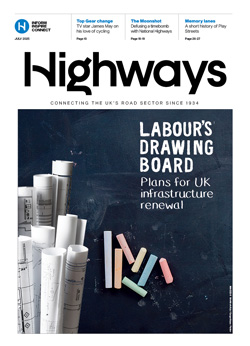The winners of Intertraffic’s prestigious Innovation Award have been announced at the event in Amsterdam in the presence of HRH Prince Constantijn van Oranje.
Parkmobile Group won the overall award with its On-Street Parking Information (OSPI) and ParkNow in-car Payments, developed in collaboration with BMW Group.
The judges said OSPI, also winner in its category Smart Mobility, is able to predict the likelihood of a driver finding a space in a particular area of a city, thanks to data from historic traffic flows, parking meters and other apps. It can then navigate directly to the best parking area and also offers a seamless payment system. The jury was particularly impressed with the level of system integration into the dashboard of the vehicle, doing away with the need for running separate smartphone apps – a point that was judged not only to improve efficiency and convenience but also, importantly, safety. Parkmobile Group also impressed with its dynamic pricing system which was entered in the Parking category – The Urban Mobility Control Management Hub (Paris).
Commenting on the win, jury member Ben Rutten of Eindhoven University of Technology, says, “The platform is to a great extent scalable to other car brands, although BMW will also keep parts of it undisclosed as a uniquely part of the BMW proposition. Parkmobile and BMW’s OSPI will result in a hassle-free last mile, as well as reducing distances driven, resulting in cleaner cities and less congested roads.”
At the ceremony, which was also attended by Cora van Nieuwenhuizen, Dutch Minister of Infrastructure and Water Management, four other category winners were recognised:
Infrastructure
In a strong and varied field, CROSS Zlin’s OptiWIM weigh-in-motion solution stood out as the winner in the infrastructure for its precision, ease of replacement and future proofing. Building upon weigh-in-motion technology, OptiWIM combines several world firsts: it is free-flow capable and accurate to 3% (even in free-flow), temperature compensated and RF immune. “The jury felt that a higher upfront cost was justified by the system’s long life expectancy and accuracy of measurement,” says jury member Adam Hill, editor of ITS International. “The fact that an entire lane can be replaced within two hours, minimizing disruption, is also attractive.”
Traffic Management
The winner in this category was CITIX 3D by Eco-Counter. This wide-range counter which has been developed over five years, impressed the panel particularly due to the fact that it delivers high levels of accuracy in detecting pedestrians, bicycles and cars, while also being extremely easy to set up. “The stereoscopic camera is innovative in that it can be installed virtually anywhere with processing done entirely at the edge, making it a lightweight solution that will serve the growing need to monitor and detect vulnerable road users,” says jury member Tom Stone, editor of Traffic Technology International magazine.
Safety
In the Safety category Sernis Technologic Solutions emerged victorious with their SR-90 intelligent road stud system. The studs, which are designed to be installed in multiples, are linked to a speed-detection system, and automatically rise above the road surface level and light up when a speeding vehicle is detected. The faster the car is going, the higher the studs are raised, although there is never any risk of damage to the car. If a car is going below the speed limit the studs remain beneath the road surface. “This is a truly innovative concept for physical speed reduction of motorized vehicles in controlled speed zones,” says jury chairman Peter van der Knaap. “The jury was impressed by the design and relatively affordability of the system and the claim that the surface is not too slippery for motorcycles or braking vehicles. This aspect, together with the obvious need to make avoiding the studs by swerving impossible, requires well-consideration of locations for initial use.”
Parking
A new solution from startup ParkHere won the Parking category. The jury agreed that the Self-powered parking sensor represented a totally new way design for such technology. It is a strip that is embedded in the roadway and gets its power from harvesting the energy of vehicles driving over it. Processing of data is carried out at a nearby base station, which forwards the information to a cloud sever. “In relation to the other nominees this is the most renewable solution for the industry,” says jury member Jorrit Weerman, CEO of Parking Network. “Furthermore, this new German startup company is solving the challenge of achieving longevity in solutions – it has a life guarantee of 25 years, and never needs electricity.”
Special Mention
The jury also gave a special mention to two further entrants – Sprinx Traffic AID by Sprinx Technology in the Traffic Management category and The Asura Recognition Unit by Asura in the Infrastructure category. Both were judged to be excellent examples of a growing trend across the industry of taking simple cameras and turning them into something much smarter, using software-only solutions.
The Intertraffic Amsterdam Innovation Award 2018 jury included Dr Peter van der Knaap (Chairman of the Jury), Managing Director – SWOV, Institute for Road Safety Research (NL), Jorrit Weerman, CEO – Parking Network (NL) and Dr. Ir. B.J.C.M. (Ben) Rutten, Program Manager – Strategic Area Smart Mobility Eindhoven University of Technology (NL).





